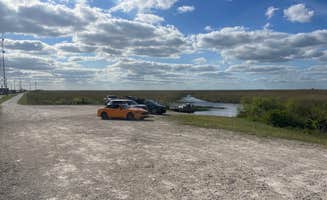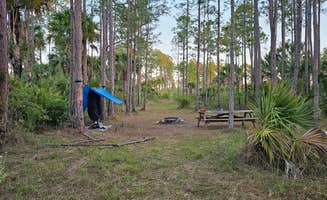Dispersed camping near Doral, Florida requires planning due to limited options in this urban-adjacent region. The surrounding wetland ecosystems of south Florida restrict primitive camping to designated areas only, with most sites requiring travel 30-60 minutes from Doral's city center. Water levels fluctuate seasonally, affecting trail conditions and accessibility at several primitive sites in the region.
What to do
Wildlife observation: Bring binoculars at Panther Camp — Big Cypress National Preserve where campers can spot native Florida wildlife. "The trail in can be muddy depending on the time of year," notes J R., adding practical timing advice for visitors planning wildlife viewing excursions.
Fishing: Pack minimal gear at L-31 Boat Ramp where bank fishing is possible without extensive equipment. Scott O. describes it as simply "Air boat launch" with "Bank fishing, no water, no services," indicating the need for self-sufficiency when fishing this location.
Stargazing: Research moon phases before planning overnight stays to maximize night sky viewing. The remote locations of primitive sites provide darker skies than in Doral proper, though some campers note light pollution can be an issue at certain locations.
What campers like
Complete solitude: Weekday visits yield the most isolated experience at primitive campsites in the region. During peak winter season (November-March), even remote dispersed camping locations can become busier, particularly on weekends.
No reservation stress: Flexibility at Ivy Primitive Camp — Big Cypress National Preserve and similar primitive sites means campers can arrive without advance booking. The free camping with no formal reservation system appeals to spontaneous outdoor enthusiasts.
Digital detox with cell backup: "Strong cell signal due to cell towers at the rest stop" mentions J R. about Panther Camp, providing reassurance for those who want isolation but need emergency connectivity.
What you should know
Permit requirements: Variable enforcement for dispersed camping permits in Big Cypress National Preserve. "You can fill out a permit from the website. However I have never been asked for it," reports one camper about Panther Camp, though regulations can change and official requirements should be verified before arrival.
Water availability: Limited sources require bringing sufficient drinking water. "There is a water hole in the back of the camp which can be filtered. However a gator generally lives there. Better to pack your water in," cautions a camper about wildlife concerns at water sources.
Light pollution considerations: Some campsites near Doral face significant light intrusion. Stephanie E. notes about L-31 Boat Ramp: "There is a detention center across the highway, the lights from the canal crossing and water pump building are extremely bright, there is a huge lit up casino about 1/4 mile away."
Tips for camping with families
Distance assessment: Measure trail length before attempting hikes with young children. The 5-mile hike to Panther Camp may be challenging for families with small children, requiring careful planning for water and supplies.
Wildlife education: Establish clear boundaries with children regarding alligator safety and wetland wildlife encounters. The presence of alligators near water sources requires heightened supervision of children at all times.
Alternative options: Consider established campgrounds if primitive camping proves too challenging with young family members. The limited facilities at dispersed sites near Doral may not accommodate the needs of families with very young children.
Tips from RVers
Size limitations: Small vehicles only at access points to dispersed camping areas near Doral. No dispersed camping sites in the immediate vicinity accommodate large RVs or trailers, with most requiring hiking access only.
Parking security concerns: Limited secure overnight parking for RVs means careful planning is necessary. Finding safe locations to leave vehicles while hiking into primitive campsites requires research and potentially contacting local authorities for guidance.
Road condition monitoring: Check weather forecasts before attempting access roads, as seasonal flooding can make routes impassable even for high-clearance vehicles during wet seasons.




